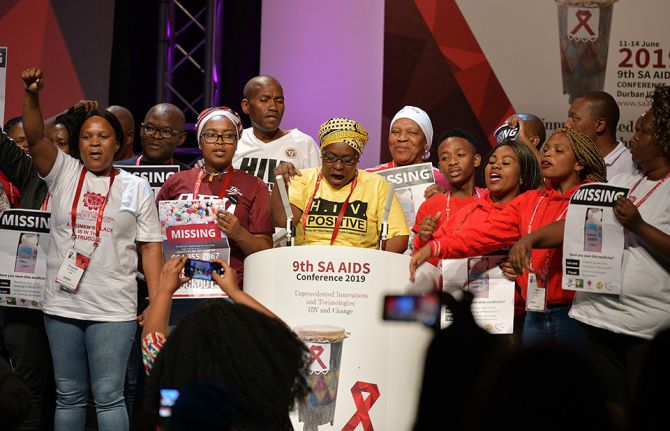

Feature Story
South Africa: pace really matters
27 June 2019
27 June 2019 27 June 2019South Africa has reaffirmed its commitment to accelerate the pace of its response to HIV in order to reach the 2020 Fast-Track targets and end the AIDS epidemic as a public health threat by 2030.
During the opening plenary of the 9th South Africa AIDS conference in Durban, UNAIDS Deputy Executive Director, Shannon Hader, reminded participants that 1in 5 people living with HIV globally lives in South Africa. The country has the largest treatment programme in the world with 4.5 million people on treatment by June 2018. However, around 3 million people living with HIV are yet to access treatment. Ms Hader also reminded the audience that the country is not on track to reach its prevention targets.
“Pace really matters. The world will only succeed in ending AIDS when South Africa succeeds,” she said. Ms. Hader noted that ending the AIDS epidemic was a strategic priority for South Africa and an essential element of the Sustainable Development Goals. “Success in HIV is success in health, and we won’t have health for all if we don’t address HIV.”
Ms Hader reiterated that UNAIDS and the UN system remain committed to support South Africa’s response to HIV and TB. “We are with you,” she said.
Delivering the opening address to the conference, South Africa’s Minister of Health, Zweli Mkhize said the success of the AIDS response to date was a tribute to the work of researchers and the courage of activists who dedicated their lives to finding solutions. “This event reminds us to harness the huge potential of people living with HIV to guide the delivery of services,” he said.
When closing the conference, South Africa’s Deputy President, David Mabuza, thanked UNAIDS and the UN system for their continued support and noted that South Africa is determined to expand HIV treatment to at least 6.1 million people by 2020. He cited Thembisa modelling by the University of Cape Town and funded by UNAIDS that suggests 12.9% of the South African population is living with HIV.
While South Africa’s HIV response is being hailed as a success, it is “clear that we are not doing well in preventing new infections,” said Mr Mabuza. “It is estimated that there are around 250 000 new infections annually, and our target is to get below 100 000 new infections by December 2020. This gap is big and it must be closed.” Mr Mabuza noted that stigma and discrimination remained a challenge to ending AIDS and he expressed determination to overcome them. “We must be compassionate and ensure that available services are provided with respect and dignity to all,“ he said.
At a pre-conference event, the UN Resident Coordinator Nardos Bekele-Thomas joined the Minister of Health, the Premier of KwaZulu-Natal, the Deputy Ministers of Justice and Social development, and several political, community and civil society leaders, to launch a new human rights and gender plan to address barriers to access HIV and TB services. The plan was handed over to Mr Mabuza, who is also Chair of the South Africa National AIDS Council during the closing session of the South African AIDS conference. Mr Mabuza welcomed the launch of the plan and said the Government was committed to ensuring every public servant provides care with compassion and at the highest possible level of quality. “This is not only a right thing to do, but a fundamental human right,” he said.
Ms Bekele-Thomas noted that South Africa has ratified several international human rights instruments and has a progressive Constitution with a bill of rights, but she said these alone were insufficient to promote and protect the rights of vulnerable and key populations. “Human rights must be respected, protected and fulfilled through the adoption of relevant strategies and implementation plans, by refraining from limiting the enjoyment of human rights, by preventing others from interfering in the enjoyment of human rights, and by promoting human rights awareness,” she said. She also commended the Global Fund for supporting the development of the plan.
The theme of the AIDS conference was “Unprecedented Innovations and Technologies” and it engaged community members, scholars and policy experts in detailed discussion of implementation science and game changing approaches, ranging from PrEP and U=U (Undetectable equals Un-transmittable) to new data on contraception and sub-national data on prevalence and progress on the 90-90-90 targets.



